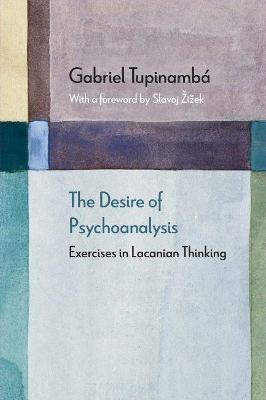The Desire of Psychoanalysis: Exercises in Lacanian Thinking

The Desire of Psychoanalysis: Exercises in Lacanian Thinking
The Desire of Psychoanalysis proposes that recognizing how certain theoretical and institutional problems in Lacanian psychoanalysis are grounded in the historical conditions of Lacan's own thinking might allow us to overcome these impasses. In order to accomplish this, Gabriel Tupinamb analyzes the socioeconomic practices that underlie the current institutional existence of the Lacanian community--its political position as well as its institutional history--in relation to theoretical production.
By focusing on the underlying dynamic that binds clinical practice, theoretical work, and institutional security in Lacanian psychoanalysis today, Tupinamb is able to locate sites for conceptual innovation that have been ignored by the discipline, such as the understanding of the role of money in clinical practice, the place of analysands in the transformation of psychoanalytic theory, and ideological dead-ends that have become common sense in the Lacanian field. The Desire of Psychoanalysis thus suggests ways of opening up psychoanalysis to new concepts and clinical practices and calls for a transformation of how psychoanalysis is understood as an institution.
The Desire of Psychoanalysis proposes that recognizing how certain theoretical and institutional problems in Lacanian psychoanalysis are grounded in the historical conditions of Lacan's own thinking might allow us to overcome these impasses. In order to accomplish this, Gabriel Tupinamb� analyzes the socioeconomic practices that underlie the current institutional existence of the Lacanian community--its political position as well as its institutional history--in relation to theoretical production.By focusing on the underlying dynamic that binds clinical practice, theoretical work, and institutional security in Lacanian psychoanalysis today, Tupinamb� is able to locate sites for conceptual innovation that have been ignored by the discipline, such as the understanding of the role of money in clinical practice, the place of analysands in the transformation of psychoanalytic theory, and ideological dead-ends that have become common sense in the Lacanian field. The Desire of Psychoanalysis thus suggests ways of opening up psychoanalysis to new concepts and clinical practices and calls for a transformation of how psychoanalysis is understood as an institution.
The Desire of Psychoanalysis proposes that recognizing how certain theoretical and institutional problems in Lacanian psycho
PRP: 356.49 Lei
Acesta este Pretul Recomandat de Producator. Pretul de vanzare al produsului este afisat mai jos.
320.84Lei
320.84Lei
356.49 LeiIndisponibil
Descrierea produsului
The Desire of Psychoanalysis proposes that recognizing how certain theoretical and institutional problems in Lacanian psychoanalysis are grounded in the historical conditions of Lacan's own thinking might allow us to overcome these impasses. In order to accomplish this, Gabriel Tupinamb analyzes the socioeconomic practices that underlie the current institutional existence of the Lacanian community--its political position as well as its institutional history--in relation to theoretical production.
By focusing on the underlying dynamic that binds clinical practice, theoretical work, and institutional security in Lacanian psychoanalysis today, Tupinamb is able to locate sites for conceptual innovation that have been ignored by the discipline, such as the understanding of the role of money in clinical practice, the place of analysands in the transformation of psychoanalytic theory, and ideological dead-ends that have become common sense in the Lacanian field. The Desire of Psychoanalysis thus suggests ways of opening up psychoanalysis to new concepts and clinical practices and calls for a transformation of how psychoanalysis is understood as an institution.
The Desire of Psychoanalysis proposes that recognizing how certain theoretical and institutional problems in Lacanian psychoanalysis are grounded in the historical conditions of Lacan's own thinking might allow us to overcome these impasses. In order to accomplish this, Gabriel Tupinamb� analyzes the socioeconomic practices that underlie the current institutional existence of the Lacanian community--its political position as well as its institutional history--in relation to theoretical production.By focusing on the underlying dynamic that binds clinical practice, theoretical work, and institutional security in Lacanian psychoanalysis today, Tupinamb� is able to locate sites for conceptual innovation that have been ignored by the discipline, such as the understanding of the role of money in clinical practice, the place of analysands in the transformation of psychoanalytic theory, and ideological dead-ends that have become common sense in the Lacanian field. The Desire of Psychoanalysis thus suggests ways of opening up psychoanalysis to new concepts and clinical practices and calls for a transformation of how psychoanalysis is understood as an institution.
The Desire of Psychoanalysis proposes that recognizing how certain theoretical and institutional problems in Lacanian psycho
Detaliile produsului








